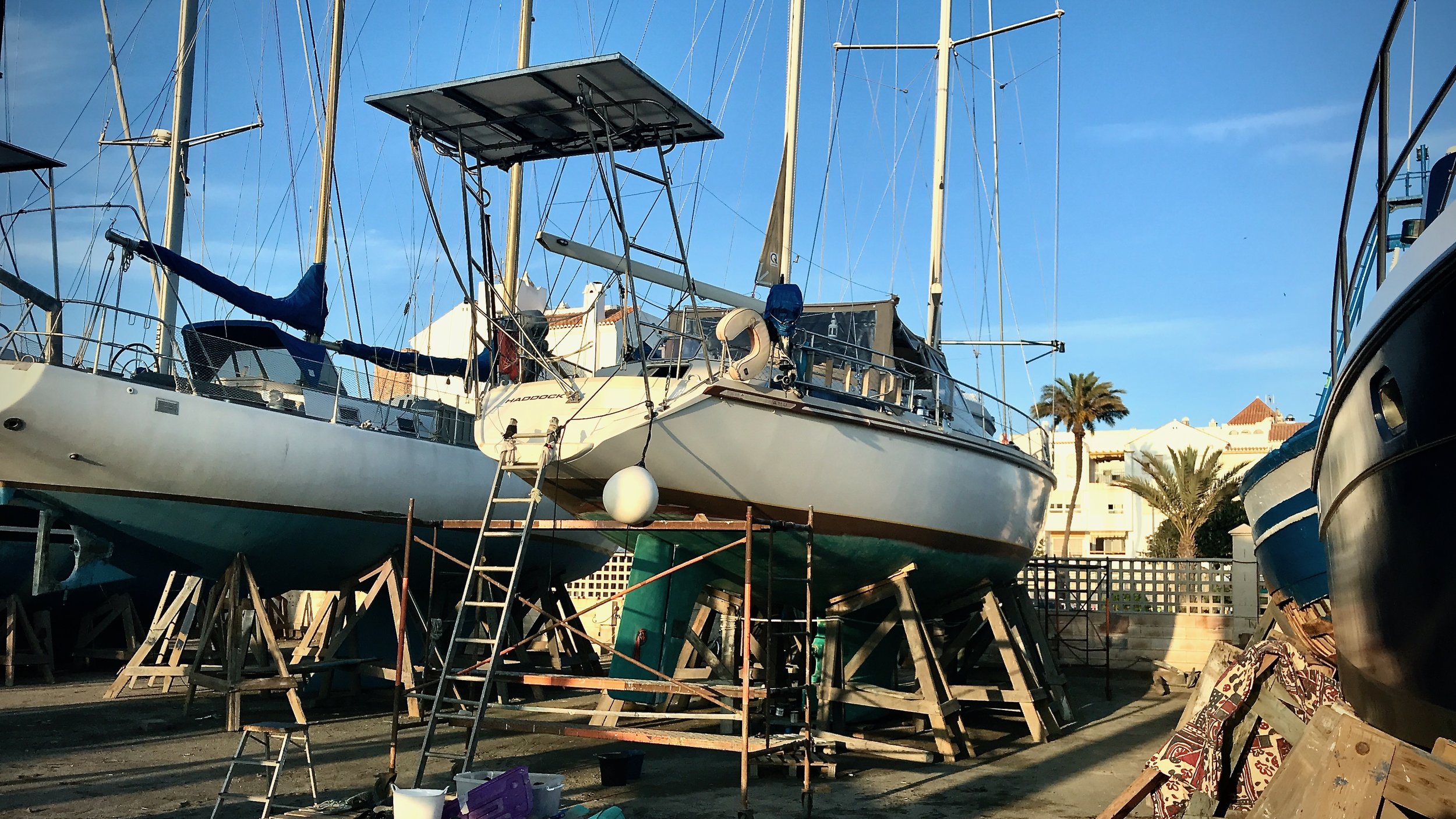Angels and Demons. Choosing a Broker and Surveyor.
01-03-12
“We are all travelers in the wilderness of this world, and the best we can find in our travels is an honest friend.”
Wreck in slings in Monastir - Tunisia
The Role of Brokers and Surveyors in the Boat Buying Process
In previous posts, I shared a few insights into the seedy underbelly of the boat buying world and warned about self-styled experts who will happily part you from a few quid if you let them. If you haven’t read “How to Buy a Boat” and “How NOT to Buy a Boat”, I strongly encourage you to do so as pretext to this post.
Who Should You Actually Pay?
So, let’s start by focusing on the two pivotal roles of yacht brokers and surveyors and understanding who they are and what they do.
Yacht brokers shouldn’t cost you a penny. They’re actually paid by the seller after the sale is done. Their loyalty, therefore, is not to you, but the person actually flogging the boat. And they’re working on commission (typically 10% of the purchase price).
The only person you should hand over your cash to at this stage is an experienced, qualified, and reputable surveyor, but only when you’ve put an offer on a boat. The broker will tell you when the time is right. Occasionally, you might also need a rigger or a mechanic for an even deeper dive into the boat’s entrails, but for now, hold off.
Occasionally, you might need a rigger or a mechanic for an even deeper dive into the boat’s entrails. Bodrum,Turkey.
The Role of a Yacht Broker
When we started searching for our boat, our first instinct was to contact brokers, assuming they were neutral parties eager to match us with the right vessel. We explained upfront that we were looking for a safe and comfortable blue-water cruiser, suitable for a young family. Despite this, we were led to boats that, frankly, were accidents waiting to happen—all because brokers were more focused on their commission rather than our safety.
So, to clarify, there are two types of brokers in this process:
Sellers Brokers
These are the most common type, working on behalf of the seller, often earning a 10% commission on the sale price. Their goal is to market the vessel, arrange viewings, and secure the best possible deal for their client—the seller. While they may assist buyers, their primary loyalty lies with the seller.
Buyer’s Agents
Less frequently used, these brokers represent buyers exclusively. A buyer’s agent helps you find the right boat, negotiates on your behalf, and may even offer post-sale support. The seller’s broker commission is typically split with the buyer’s agent, meaning you don’t pay them directly in most cases.
There are two types of representatives in the boat buying process: Sellers Brokers and Buyer’s Agents
Given the potential advantages, it’s surprising that more buyers don’t employ a buyer’s agent. However, be wary of brokers claiming to represent both buyer and seller in a "dual agency" arrangement. This creates a conflict of interest that may compromise your position as a buyer.
If you decide to hire a buyer’s agent, do your homework. Look for personal recommendations from experienced boaters, and obviously prioritise those with a solid reputation. Brokerage firms like Denison Yachting, Fraser Yachts, and Northrop & Johnson are good starting points for international transactions. Websites like YachtWorld and Boats.com also allow you to filter for brokers and agents.
Do You Really Need a Surveyor?
Like a good accountant, a good surveyor should save you money. A survey isn’t just another bill, it’s an investment. Similarly to choosing a buyer’s agent, don’t just rely on slick websites or fancy business cards to choose a surveyor. Get personal recommendations from owner groups, online boating forums, and WhatsApp groups dedicated to the boat model you’re eyeing up.
Think of it as a home inspection, but instead of checking for shoddy wiring and dry rot, they’re looking for osmosis, engine wear, and whether that rudder is hanging by a thread. And if you do decide to make an offer before a survey, always make sure that offer is “subject to survey.”
When it comes to surveyors, you need someone who’s seen it all and isn’t afraid to pull things apart and be frank with you.
Before seeking out a surveyor, check out forums that discuss issues with the model of boat you’re planning to buy. Tread lightly, be diplomatic, and don’t forget that these owners have a vested interest in maintaining the reputation of their valued asset. They are not going to say anything that will explicitly compromise that asset but will talk all day about common maintenance issues.
And no doubt you will kick off an argument or two amongst owners in the process. Don’t worry; it just seems part and parcel of the online world these days. Boating chatrooms are no different.
Once you’ve armed yourself with these known issues, discreetly discuss them with a handful of surveyors you’re considering hiring to see if they’re aware of them. If they say, “Ooh, I’ve always wanted to survey one of those boats!” or turn up in a hot pink dress and heels (yes, these things really have happened to cruising friends!) turn to a different surveyor.
Now, I’m not saying they aren’t qualified, but you don’t want an enthusiastic newbie or someone who’s not prepared to get down and dirty with the boat in the right way. You need someone who’s seen it all and isn’t afraid to pull things apart and be frank with you.
A good surveyor will know that every boat has its Achilles’ heel. A design flaw here, a quirky bit of rigging there, if your surveyor can’t find anything wrong, then they either don’t know the boat or aren’t looking hard enough. Equally useless is a fifty-page report full of generic cut-and-paste observations that could apply to anything from a superyacht to a dinghy. What you need is a tailored, comprehensive report, a legal statement of the boat’s condition, the equipment’s state, and an estimated value.
You need a tailored, comprehensive report—a legal statement of the boat’s condition, the equipment’s state, and an estimated value.
Buying Sight Unseen
Look, I get it and I’ve been there myself. You narrow down the type of boat you want and you spend months or even years scouring the internet for it. Then one day, the ‘perfect’ boat pops into your feed. It looks and sounds amazing, is reasonably priced, and you know it won’t be on the market for long. You email questions to the broker, who replies with generic answers or worse, doesn’t get back to you at all. You begin to panic and start making arrangements to go and see the boat then, without warning, it’s ‘under offer,’ and you’ve literally missed the boat. You’re devastated and promise yourself that next time you see a similar boat advertised, you’ll just snap it up sight unseen.
But, back up a second. ‘Under offer’ doesn’t mean it’s sold. You can still register your interest with the broker and ask to be kept informed of the progress of the sale. Many sales go sour for a multitude of reasons: lack of adequate finance by the buyer, a problem found during the survey, or the buyer being a serial tyre kicker that ends up testing the patience of the seller and broker.
But never be tempted into buying a boat sight unseen. As I pointed out in the blog How NOT to Buy a Boat, I have encountered boats in boatyards receiving a professional buff, polish, and anti-foul to make them look picture-perfect for their online debut, which glossed over the fact that recent surveys had written them off.
The Limitations of Surveys and Inspections
While there ARE buyers who will purchase a boat sight unseen, I have yet to hear of an example where it turned out well. The cruising adventure never seems to go far or last very long. One poor family I met in Malta had been stuck there for three years, desperately trying to raise funds for repairs on their beautiful Nauticat (a boat with a solid reputation) that they had bought sight unseen, but was later found to have major underlying structural issues.
A quick chat with the yard crew or marina staff can reveal invaluable insights about a boat’s condition and history. Almerimar, Spain
I’ve also heard of hurricane-damaged boats from the Caribbean being shipped to Europe, where they receive cosmetic repairs and are placed back on the market with an unblemished history. It’s a highly unregulated market and, as I mentioned at the beginning, where there are large amounts of cash exchanging hands, there are also dodgy geezers sniffing around trying to cream off a few quid for themselves.
If you can get to see the boat before putting in an offer, have a quick chat with the yard crew or marina staff. It can reveal invaluable insights about a boat’s condition and history. So, look for the hardest-working, hands-on guy in the place, often the one covered in dirt with a grinder in hand. A ten-minute chat with him could save you from purchasing a lemon.
Patience and Due Diligence
You will never be able to determine whether a boat is turnkey ready, or a complete dud purely on the basis of photos, online descriptions, the listings broker, or even from looking it over yourself, unless of course, you have oodles of experience with that particular make and model of boat.
There's no guarantee, even with a survey you’ll uncover every issue, but it will at least massively increase the odds of securing a great boat
Even with a comprehensive survey and a thorough sea trial, there’s no guarantee you’ll uncover every issue. Boats are notorious for quick fixes, temporary solutions that might get you through a few days but could lead to bigger problems later. If you can, negotiate a handover period with the previous owner. This not only gives you a chance to learn more about the boat but also indicates that the owner is confident in its quality.
Make no mistake: even with a careful survey, things can be missed, but it will at least massively increase the odds of securing a great boat if you are patient and diligent in these early stages.
That’s it for this week, next week we discuss eating out.
If you want more straight-talking tales from life afloat, and information on choosing brokers and surveyors, then you’ll love our upcoming book. We're inviting early readers to join the pre-launch crew and get behind-the-scenes access as we wrestle it into shape. It’s honest, unfiltered, and occasionally useful. Sign up here to get involved, give feedback, and be part of something that’ll either be a bestseller or a brilliant cautionary tale.








